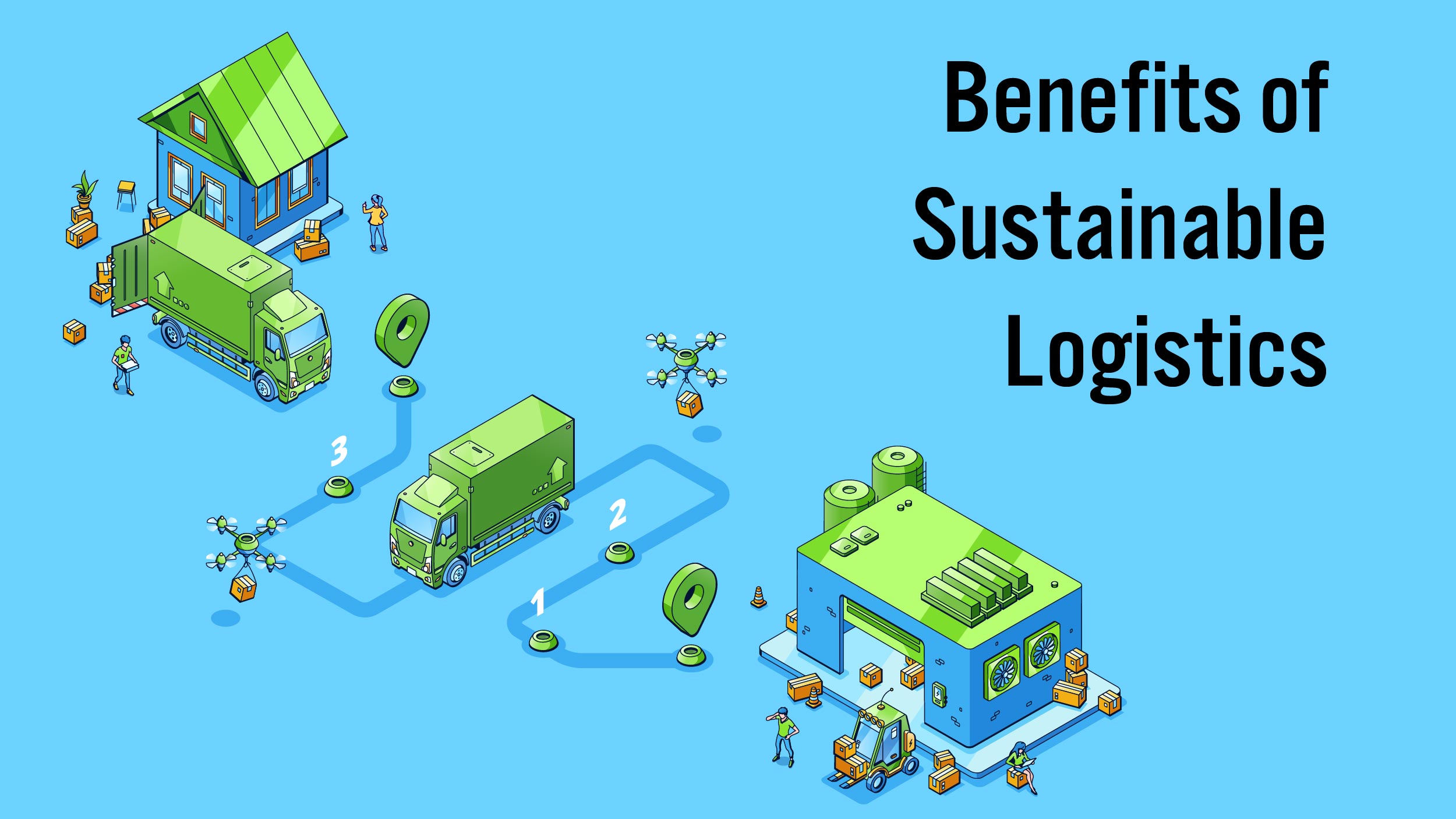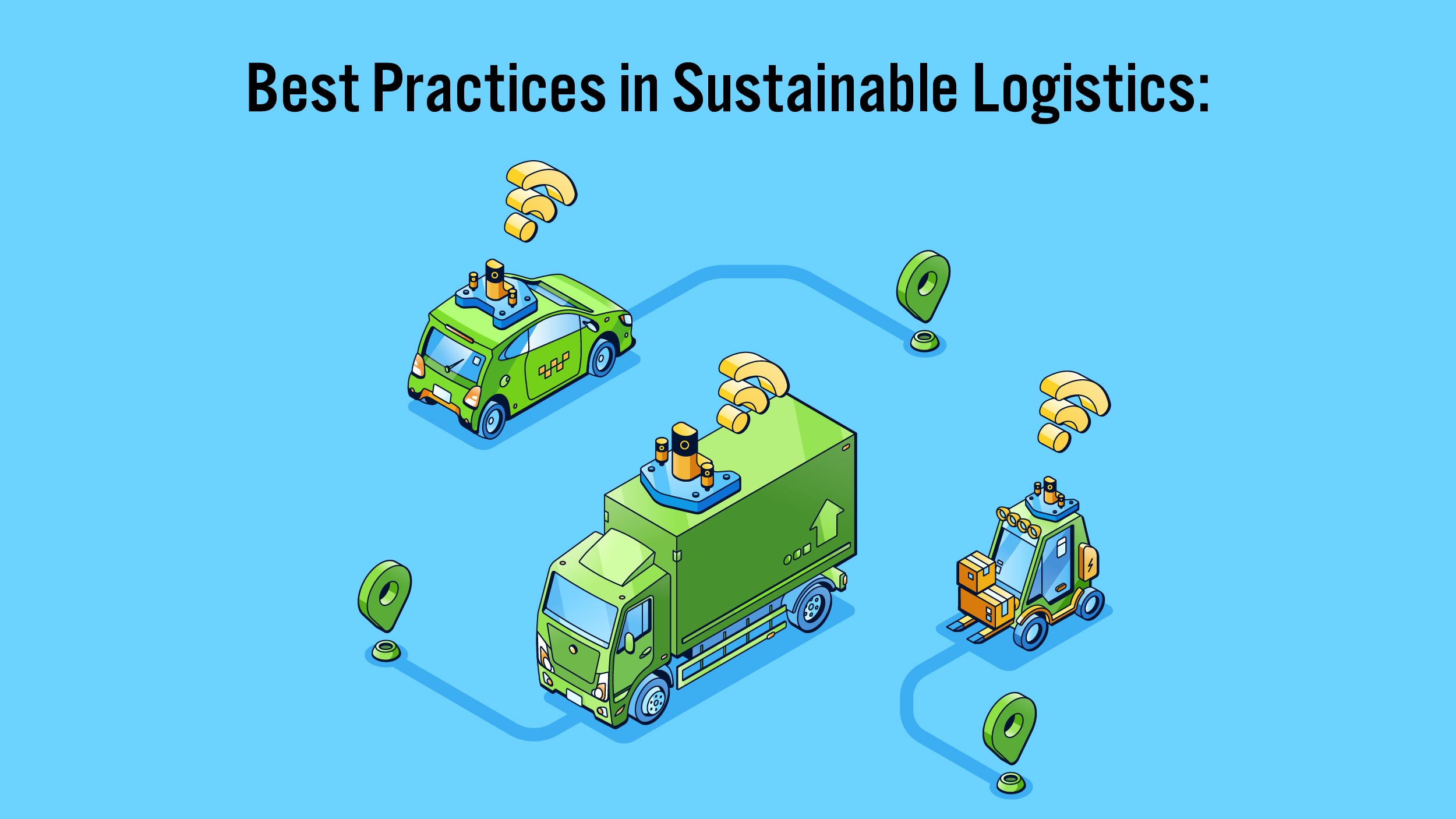Traditional logistics practices have long relied on fossil fuels, resulting in high greenhouse gas emissions, air pollution, and resource depletion. Additionally, inefficient transportation routes, excessive packaging, and poor waste management have further contributed to the environmental impact of logistics operations. This is where sustainable logistics comes into play.
It offers a way forward by integrating environmental, social, and economic considerations into supply chain management. It aims to minimize the negative impact of logistics operations on the environment while optimizing efficiency and cost-effectiveness. By adopting sustainable practices and technologies, companies can reduce their carbon footprint, enhance operational resilience, and contribute to a greener future.
What is Sustainable Logistics?
Sustainable logistics encompasses a range of practices and strategies aimed at reducing the environmental impact of transportation, warehousing, and distribution activities. It involves the use of innovative technologies, alternative fuels, efficient route planning, waste reduction, and collaboration across the supply chain. This logistics method seeks to strike a balance between economic growth, social responsibility, and environmental stewardship.
Benefits of Sustainable Logistics

- Environmental Preservation: By embracing sustainability, companies can significantly reduce their carbon emissions, air pollution, and waste generation. This contributes to the preservation of ecosystems, biodiversity, and the overall health of the planet.
- Cost Savings: Sustainable practices often lead to cost savings in the long run. Efficient route planning, optimized vehicle utilization, and energy-saving technologies can help reduce fuel consumption and operational expenses.
- Enhanced Reputation: Embracing sustainability can enhance a company’s reputation, attract environmentally conscious customers, and foster positive relationships with stakeholders. It demonstrates corporate social responsibility and a commitment to a sustainable future.
Also Read : Everything You Need to Know About Hypersonic Flight in 2024
Best Practices in Sustainable Logistics:

- Eco-Friendly Transportation: Adopting alternative fuels, electric vehicles, and hybrid technologies can significantly reduce carbon emissions and air pollution. Efficient route planning and load consolidation also contribute to reducing fuel consumption and emissions.
- Green Warehousing: Implementing energy-efficient lighting systems, utilizing renewable energy sources, and optimizing storage space can minimize energy consumption and waste generation in warehouses.
- Packaging Optimization: Reducing packaging materials, using recyclable materials, and implementing returnable packaging systems can minimize waste and promote circular economy principles.
4 Ways Sustainable Logistics Can Help Your Business
Now that we have a fair idea, let’s see how these logistics practices can help businesses.
Aligning with Environmental Regulations
Partnering with sustainable logistics providers not only facilitates talent acquisition but also ensures compliance with evolving environmental regulations. With carbon emissions tracking and reporting becoming obligatory, businesses must minimize emissions across their supply chains. International standards now mandate companies to reduce not only their direct emissions but also those from their suppliers. By collaborating with sustainable logistics partners adept at emission reduction throughout the supply chain, companies ensure resilience and adaptability amidst tightening regulations.
Upholding Social Sustainability in Logistics
Beyond environmental concerns, responsible logistics providers prioritize social sustainability, crucial for today’s discerning consumers. Gen Z, in particular, demands authenticity, favoring companies that truly embody their stated values. By partnering with socially responsible logistics providers, businesses mitigate risks associated with unethical labor practices, fostering trust among consumers and employees alike.
Leveraging Sustainable Logistics for Growth
Prioritizing sustainability not only benefits the planet but also bolsters brand image and market competitiveness. Consumer willingness to pay more (12%) for sustainable products has surged across generations, reflecting a growing demand for eco-friendly solutions. However, genuine sustainability efforts are paramount, as consumers increasingly scrutinize claims and demand transparency. Partnering with logistics providers enables companies to deliver on their sustainability promises, fostering trust and long-term customer loyalty
Increased Commitment
As Gen Z emerges as the largest demographic cohort, companies are vying for their attention and talent. This generation, characterized by heightened environmental consciousness, seeks employers aligned with their values. Research indicates that a significant majority prioritize working for organizations committed to sustainability. Moreover, Gen Z’s adeptness at digital research ensures they can discern genuine sustainability efforts from mere greenwashing. Therefore, companies integrating sustainability into their supply chains stand to attract and retain digitally-savvy Gen Z workers.
Decoding the Use Cases
- Last-Mile Delivery: Logistics practices are particularly relevant in urban areas, where last-mile delivery accounts for a significant portion of emissions and congestion. Companies can adopt electric vehicles, bike couriers, or use centralized pickup locations to reduce carbon emissions and improve delivery efficiency.
- Reverse Logistics: Proper management of product returns, repairs, and recycling can significantly reduce waste and promote resource conservation. Companies can implement efficient reverse logistics processes to minimize environmental impact.
- Supply Chain Collaboration: Collaborative efforts among supply chain partners, such as sharing transportation resources and collaborating on warehousing and distribution, can lead to shared efficiencies and reduced environmental impact.
What Are The Sustainable Factors In Logistics?
- Carbon Emission Reduction: A fundamental aspect of sustainable logistics involves minimizing carbon emissions. This goal can be accomplished through diverse methods, such as integrating alternative fuels, and electric or hybrid vehicles, and optimizing routes and loads to reduce fuel consumption and emissions.
- Energy Conservation: Another crucial sustainability factor is promoting energy efficiency. This entails implementing energy-saving technologies, optimizing warehouse lighting, and harnessing renewable energy sources to lower energy consumption and minimize environmental impact.
- Waste Management and Recycling: Sustainable logistics focuses on reducing waste and promoting recycling. Strategies include optimizing packaging to minimize waste, adopting returnable packaging systems, and maximizing container and trailer utilization to avoid transporting partial loads. Effective waste management and recycling processes help conserve resources.
- Collaboration and Supply Chain Transparency: Collaboration among supply chain partners is key to sustainability. By sharing transportation resources, optimizing routes, and collaborating on warehousing and distribution, companies can achieve efficiencies and reduce environmental impact. Transparent supply chain practices aid in identifying improvement areas and implementing sustainable measures
- Technology Integration: Embracing technology and innovation is essential for sustainable logistics. This involves implementing advanced logistics management systems, utilizing data analytics for optimization, and deploying Internet of Things (IoT) devices for real-time monitoring. Technological solutions enable more efficient operations and informed decision-making.
Final Takeaway
Sustainable logistics represents a paradigm shift in the way we approach supply chain management. By integrating environmental considerations into logistics operations, businesses can minimize their carbon footprint, reduce waste, and promote a greener future. The benefits of logistics extend beyond environmental preservation, as companies can also achieve cost savings, enhance their reputation, and engage stakeholders. As the world continues to prioritize sustainability, embracing sustainable logistics is not only a responsible choice but also a strategic advantage in a rapidly changing business landscape.



